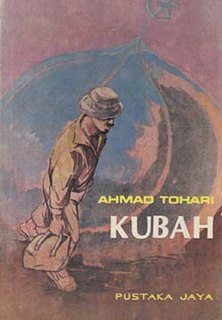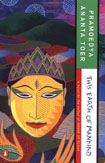 W
WChild of All Nations is the second book in Pramoedya Ananta Toer's epic quartet called Buru Quartet, first published by Hasta Mitra in 1980. Child of All Nations continues the story of the lives of the main character, Minke, and his mother in law, Nyai Ontosoroh. By describing the lives of these two people who live in the Dutch controlled islands of Java, Pramoedya is able to discuss many aspects of life in a colonized nation. Child of All Nations explores the social hierarchy in a colonized nation by giving glimpses of how the oppressed colonized peoples, such as the Javanese farmers, are required to be submissive to their occupiers, the Dutch. That wealthy, educated Javanese like Minke and Nyai were still considered inferior to the Dutch due to their Native birth status and frequently simply the color of their skin. The main theme of the novel is, as the title suggests, that the world is becoming more integrated as revealed in the life of the main character Minke, the self-proclaimed "child of all nations" 1. Minke speaks French, Dutch, Malay, and both high and low Javanese. He writes for a newspaper published in Dutch and has to come to terms with being a 'native' in a European controlled world. His worldview is jaded by the fact that he is wealthy and educated, and therefore closer to the Dutch than other Javanese; however, Minke comes to realize the ethical implications of the injustices being done to his people. His life is caught between two worlds, which the novel follows as he tries to understand who he really is, his role in the Dutch-occupied society, and his duty to his people.
 W
WClear Light of Day is a novel published in 1980 by Indian novelist and three-time Booker Prize finalist Anita Desai. Set primarily in Old Delhi, the story describes the tensions in a post-partition Indian family, starting with the characters as adults and moving back into their lives throughout the course of the novel. While the primary theme is the importance of family, other predominant themes include the importance of forgiveness, the power of childhood, and the status of women, particularly their role as mothers and caretakers, in modern-day India.
 W
WThe Day Lasts More Than a Hundred Years, originally published in Russian in the Novy Mir literary magazine in 1980, is a novel written by the Kyrgyz author Chinghiz Aitmatov.
 W
WDaylight Robbery is a thriller novel written by Surender Mohan Pathak, a Hindi writer from Delhi, India.Originally published in 1980 by Shanu Paperbacks, it was translated into English by Sudarshan Purohit and published by Blaft Publications, Chennai, India in 2010.
 W
WDevil on the Cross is 1980 Gĩkũyũ language novel written and self translated by Kenyan novelist Ngũgĩ wa Thiong'o, which was later republished as part of the influential African Writers Series in 1982. The novel, though dealing with a diverse range of literary conventions and themes, focuses on politically challenging the role of international money and culture in Kenya.
 W
WDe droomkoningin is a novel by Dutch author Maarten 't Hart. It was first published in 1980.
 W
WEternal Curse on the Reader of These Pages is a 1980 novel by Argentine novelist Manuel Puig. Originally written in English, it was first published in Spanish in the author's own translation. As in other works by Puig, the story is formally experimental, consisting of mostly unattributed dialogue, digressing into stories within stories. It also bears many of Puig favorite motifs, including sexuality and leftist revolutionary politics.
 W
WThe Fifth Horseman is a 1980 techno-thriller novel written by Larry Collins and Dominique Lapierre. The story revolves around Libyan leader Qaddafi holding New York City hostage with the threat of setting off a hidden nuclear bomb. The book had such a shocking effect that the French government cancelled the sale of nuclear reactors to Libya, even though they were meant for peaceful purposes.
 W
WHumlehjertene is a novel published in 1980 by the Norwegian writer Ola Bauer. The narrator travels to Paris, falls in love with the Finnish girl "Marja", and ends up on the barricades with paving stones in his hands. As a former journalist Bauer had been in Paris during the May 1968 events. Bauer was awarded the Gyldendal's Endowment for his literary works in 1982.
 W
WKubah is an Indonesian novel written by Ahmad Tohari. It follows a poor man named Karman who becomes a member of the Indonesian Communist Party, only to find himself a victim of the ongoing political struggles in 1950s Indonesia. After the Party's destruction he spends twelve years as a prisoner at Buru before returning to his hometown and becoming a devout Muslim.
 W
WThe Lovelock Version is a long historical novel by New Zealand writer Maurice Shadbolt that calls into question the interpretation of the past through the narrative process. Published in Auckland and London in 1980 and in New York in 1981, it won the New Zealand Book Award for Fiction and the James Wattie Award.
 W
WThe Monitor, the Miners, and the Shree is a novel by Lee Killough published in 1980.
 W
WThe Name of the Rose is the 1980 debut novel by Italian author Umberto Eco. It is a historical murder mystery set in an Italian monastery in the year 1327, and an intellectual mystery combining semiotics in fiction, biblical analysis, medieval studies, and literary theory. It was translated into English by William Weaver in 1983.
 W
WNeidontanssi is a historical novel by Finnish author Kaari Utrio.
 W
WOctober's Baby is a novel by Glen Cook published in 1980.
 W
WOne Day of Life is a novel by Salvadoran author Manlio Argueta. The novel is set in Chalatenango, El Salvador and follows the daily life of Guadalupe Guardado and the women of her family just prior to the Salvadoran Civil War. The book was banned by the government of El Salvador after its 1980 release for its descriptions of human rights violations by the Organización Democrática Nacionalista, the government's paramilitary intelligence organization.
 W
WPinball, 1973 is a novel published in 1980 by Japanese author Haruki Murakami. The second book in the "Trilogy of the Rat" series, it is preceded by Hear the Wind Sing (1979) and followed by A Wild Sheep Chase (1982), and is the second novel written by Murakami.
 W
WA Princess in Berlin is a 1980 historical novel by Arthur R.G. Solmssen.
 W
WRespiración artificial is an Argentine novel, written by Ricardo Piglia. It was first published in 1980. Praised by critics, the work has been the subject of several studies. The epigraph which opens the novel is a quote by T.S Eliot and the key to understanding the novel. The back cover of the book reads: “Conceived as a system of quotes, cultural references, allusions, plagiarisms, parodies and pastiches, Piglia's novel is not only the realization of Walter Benjamin's old dream ; it is as well a modern and subtle detective novel″.
 W
WRituals is a 1980 novel by Dutch writer Cees Nooteboom.
 W
WThe Chinese Agent (1970) is a comic novel by Michael Moorcock. It is a revision of Somewhere in the Night, which Moorcock published in 1966 under the pseudonym Bill Barclay. Although Moorcock is best known as the author of fantasy fiction and science fiction-based parables such as Behold the Man and The Dancers at the End of Time, here he writes a light-hearted caper that parodies the spy novel genre.
 W
WThe Spike is a 1980 spy thriller novel by Arnaud de Borchgrave and Robert Moss. Drawing on de Borchgrave's experience as a jet-setting Newsweek journalist and conservative Washington insider, it tells the story of a radical '60s journalist, Bob Hockney, who stumbles upon a Soviet plot for global supremacy by 1985. When he tries to expose the web of blackmail, sex and espionage, he's hamstrung by his editors' liberal media bias.
 W
WThis Earth of Mankind is the first book in Pramoedya Ananta Toer's epic quartet called Buru Quartet, first published by Hasta Mitra in 1980. The story is set at the end of the Dutch colonial rule and was written while Pramoedya was imprisoned on the political island prison of Buru in eastern Indonesia. The story was first narrated verbally to Pramoedya's fellow prisoners in 1973 because he did not get permission to write. The story spread through all the inmates until 1975 when Pramoedya was finally granted permission to write the detailed story.
 W
WThousandstar is a novel by Piers Anthony published in 1980.
 W
WThe Tragedy of the Street of Flowers is a novel by José Maria de Eça de Queirós, also known as Eça de Queiroz. It was only first published in Portuguese in 1980. The first English version, translated by Margaret Jull Costa, was published by Dedalus Books in 2000, to coincide with the centenary of the author’s death.
 W
WTuareg (ISBN 184694192X) is a thriller novel written by Spanish author Alberto Vázquez-Figueroa. This novel was his most critically and commercially successful, with global sales in excess of 5,000,000 copies. It was adapted into a 1984 movie starring Mark Harmon, Tuareg – The Desert Warrior.
 W
WVan Troff's Cylinder is a social science fiction novel by Polish writer Janusz A. Zajdel. The novel covers the problems of time travel, society development, eugenics and isolated societies. At the time of its release it was treated as a warning for totalitarian systems.
 W
WWaiting for the Barbarians is a novel by the South African writer J. M. Coetzee. First published in 1980, it was chosen by Penguin for its series Great Books of the 20th Century and won both the James Tait Black Memorial Prize and Geoffrey Faber Memorial Prize for fiction. American composer Philip Glass has also written an opera of the same name based on the book which premiered in September 2005 at Theater Erfurt, Germany.
 W
WWomen of Algiers in Their Apartment French: Femmes d'Alger dans leur Appartement is a 1980 novel by the Algerian writer Assia Djebar. It is a collection of short stories celebrating the strength and dignity of Algerian women of the past and the present. It interweaves the stories of the lives of three Muslim Algerian women. Assia Djebar's inspiration to write Femmes d'Alger dans leur appartement came from Delacroix's painting The Women of Algiers.
 W
WWonderful, Wonderful Times is a novel by Austrian writer Elfriede Jelinek, published in 1980 by Rowohlt Verlag. It is Jelinek's fifth book. An English version, translated by Michael Hulse, was released in 1990 by Serpent's Tail. A film adaptation of the novel was released in 1982.